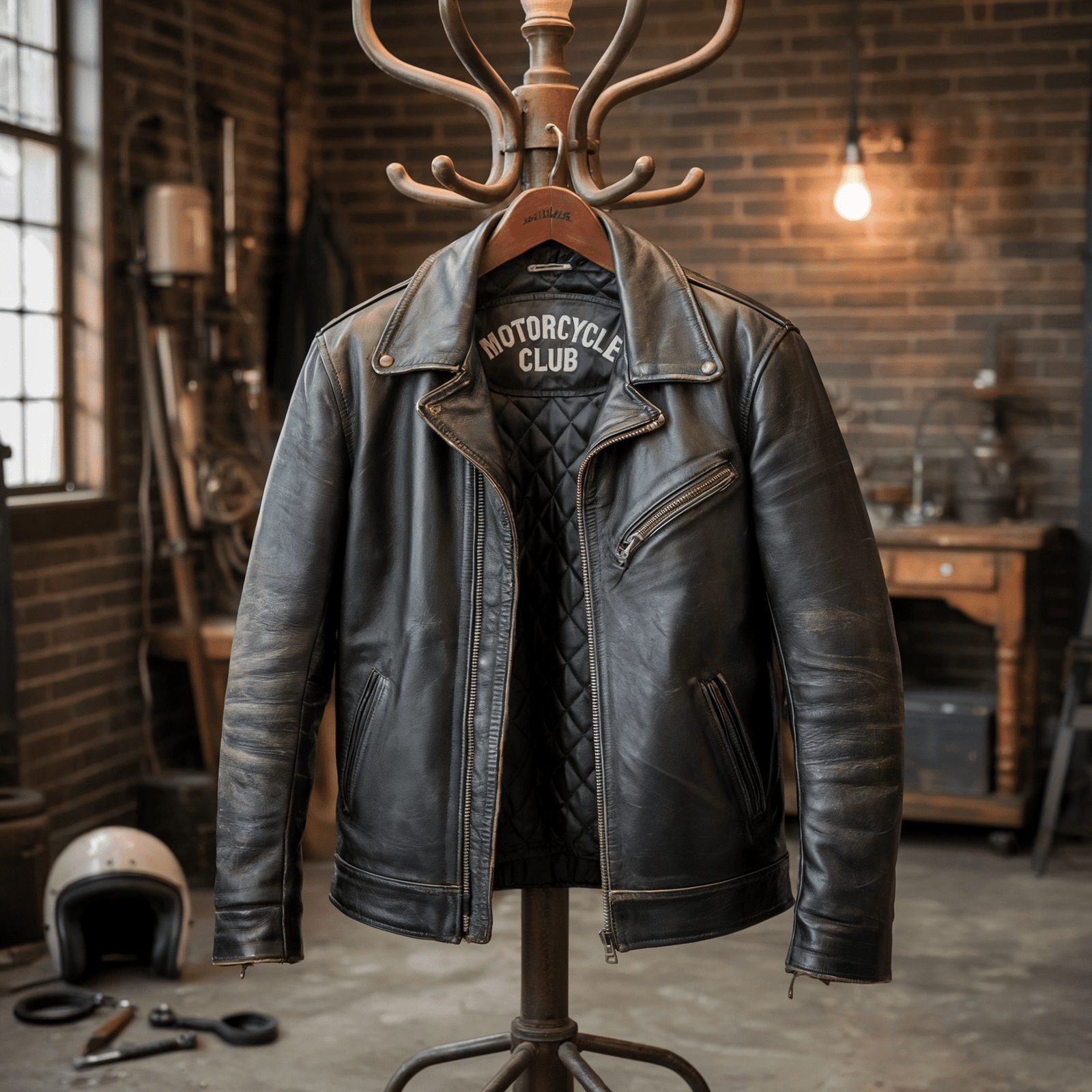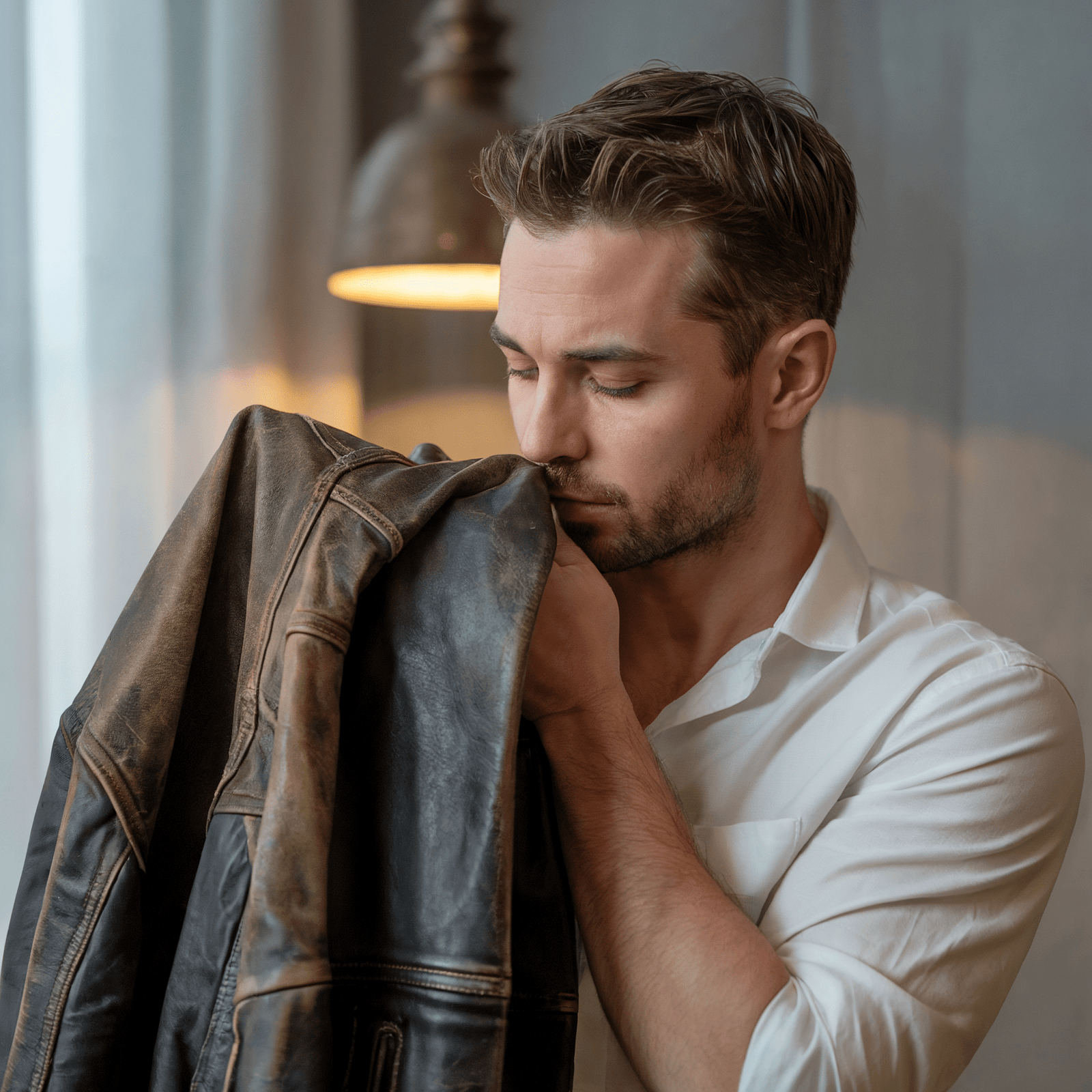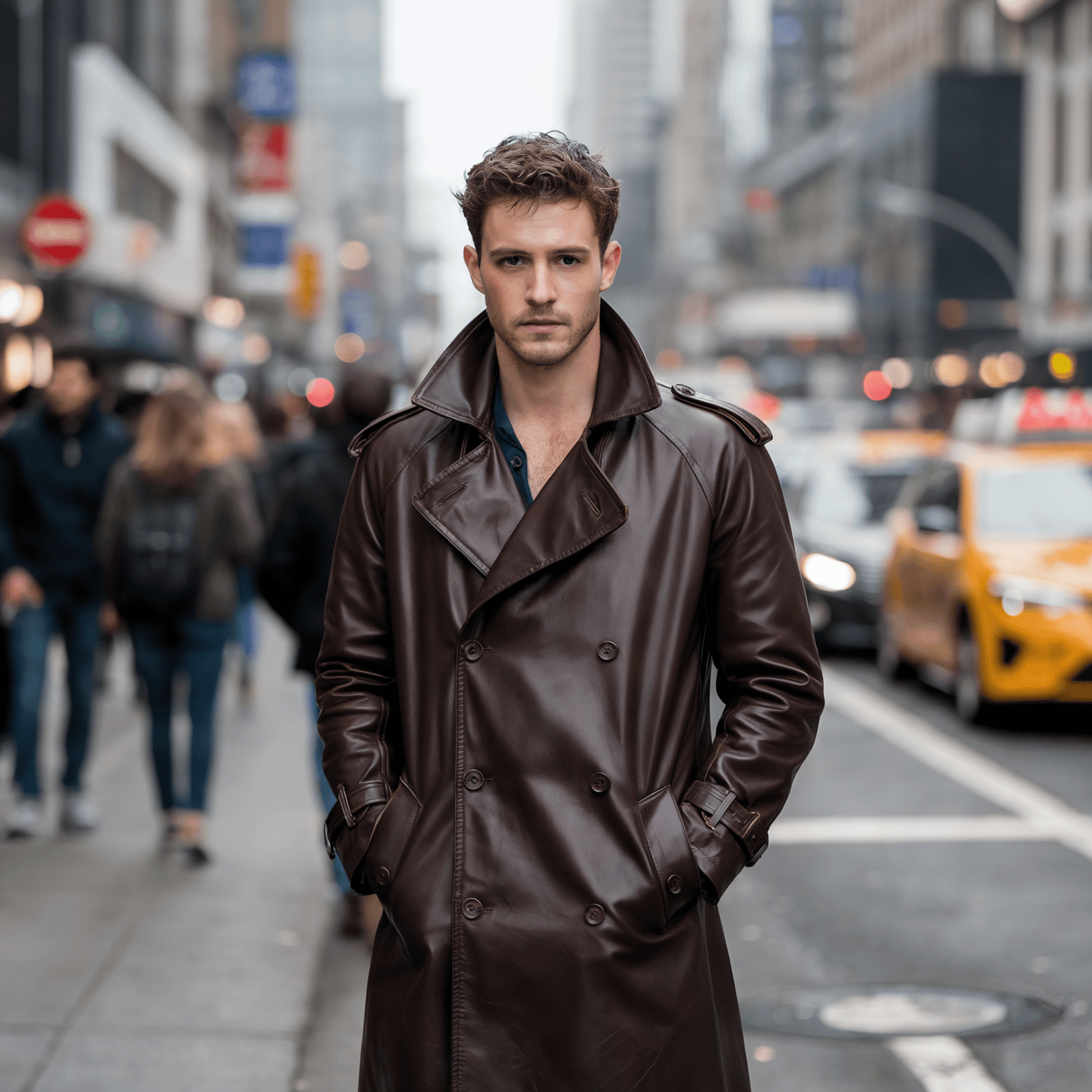Your Cart is Empty
HAPPY HOLIDAYS! SALE 10% OFF - USE COUPON HOLIDAYS AT CHECKOUT NOW!
Menu

HAPPY HOLIDAYS! SALE 10% OFF - USE COUPON HOLIDAYS AT CHECKOUT NOW!

Top Grain Leather Explained
by Jennifer Smith July 12, 2025 7 min read
Key Takeaways:
- Top grain leather is real leather from the top layer of the animal hide, sanded for a smooth finish.
- It’s durable, polished, and sits just below full-grain leather in quality.
- Commonly used in jackets, bags, and luxury interiors, top-grain leather has a uniform, corrected surface.
When you shop for a leather jacket or any other real leather product, you will see labels with terms like “top grain leather,” “full grain,” or “genuine leather.” These words can sound technical. But if you are spending money on a leather piece, you need to know exactly what you are getting.
This guide explains what top grain leather is, how it compares to other types like full grain leather, and why it might be the right pick for your leather jacket.
What is Top Grain Leather?

To define top grain leather, we can say that it’s not plastic. It’s not synthetic. It’s real, natural, quality grade leather.
Top grain leather is real leather made from the uppermost layer of the hide. It comes from the same section used to make full grain leather. One of the distinct differences is that top grain is lightly sanded to remove surface imperfections. This is the reason it is also known as corrected grain leather. Sanding removes the imperfections on the hide on the very top layer, making the leather thinner, giving it a fresh top surface and more uniform appearance.
It’s also not to be confused with genuine leather. Genuine leather refers to the lower layers of the hide, often glued and pressed together. It’s cheaper and far less durable, but technically leather.
What is Top Grain Leather Made Of?
Top grain leather is made of the top layer of the animal hide, which is the strongest and most durable part of the hide. To process it, cow hides prepared after the tanning process by manufacturers have the outer grain removed through sanding or buffing. Then they apply a finish or pigment for color and protection. This process gives it a smooth leather texture and consistent color.

Full Grain Leather vs. Top Grain Leather
Both full grain and top grain are collectively called grain leathers. Grain leather means leather that includes the outer grain surface of the hide.
Full grain leather is the highest grade of leather. It keeps the entire grain layer intact, with natural texture and scars, the markings which tell whether the animal had an easy or rough life (a blemish free hide means it comes from an animal who was raised with a lot of care, plus the affects of a rough life shows many markings). It's stiffer, thicker, and ages with a rich patina. Full grain cowhide leather is the most durable of all, but as it is harder to produce, it costs more.
Top grain leather, on the other hand, is the second-highest quality leather. Its outermost layer is sanded slightly for a cleaner, uniform surface, which takes away from the entire thickness of the hide. It’s softer, more flexible, and still highly durable. One of the key differences is that it doesn’t develop the same natural patina, but many people prefer the sleek, uniform look. Full grain is tougher with a natural beauty, but top grain is softer, more polished, and often more practical for daily wear.
Top Grain Leather in Comparison
Top grain leather sits just below full grain leather in quality but far above lower-grade options like genuine, split leather, bonded leather, microfiber leather, or bi-cast leather, most of which have faux finishes. While it’s not as tough or raw as full grain, it still retains much of the hide’s natural characteristics, such as its strength. The outer layer is lightly sanded and finished, making it easier to maintain and more affordable.
Benefits of Top Grain Leather
A top grain leather product, such as a leather jacket, looks sharp. It wears well and feels soft right out of the box. It doesn’t need as much breaking in as full grain. Plus, top grain leather products handle daily use better than lower-grade leather. Its finish remains unbroken for long.
One of the prime reasons top grain is highly sought after is that it holds its shape, resists stains, and looks smooth. The leather finish protects it from water and light scratches. You won’t get that deep aging effect full grain gives, but you will get a clean, stylish product that lasts for years.
Top grain leather is more oil-resistant than full grain, but not completely stain-proof. It does have some oil absorbing properties As opposed to full grain, top grain leather is easy to maintain and doesn’t fade easily.
Drawbacks to Consider
Top grain leather is thinner than full grain. That means it’s a little less rugged. Over time, it won’t develop a deep patina. If you are after that aged, vintage look with a future patina, full grain might suit you better.
Also, because it’s sanded and treated with finishes and pigments, top grain leather is not as breathable. But in return, you get easier maintenance and resistance to water and dirt.
How to Identify Top Grain Leather
You can spot top grain leather by its smooth surface and even texture. Though it has all the tell tale signs of real leather, it looks more “perfect” than full grain. There are no scars or wrinkles visible. To spot top grain leather, look at the grain pattern. It will be uniform. That’s because it's been corrected.
That’s basically how you spot a cheap vs expensive leather jacket. Smell the leather. Real top-grain leather smells rich and earthy. If it smells like plastic or chemicals, it’s not the real thing.
Uses of Top Grain Leather
Top grain leather is the most used leather type for jackets, bags, belts, shoes, wallets, and furniture. Especially, the winning combo of durability and polished appearance makes it an in demand material for footwear and luggage tout. It works well in both fashion and interior design because it balances strength with a refined look. You’ll find it in high-end car interiors and or on a luxury leather sofa because it holds up to wear while looking smooth and clean.
In furniture, top grain leather covers the entire seating surface in many premium designs. This means the parts you touch, seat cushions, armrests, and backrests, are made with top grain leather, while lower-cost materials may be used on hidden sections. This allows for comfort, durability, and cost-efficiency without sacrificing quality where it matters most.
Is Top Grain Leather Good for Jackets?
Yes, it is. If you want a jacket that looks good, lasts long, and feels soft, top grain leather works well. It’s more affordable than full grain, but still gives you the strength and feel of real leather. It’s a smart balance between looks, comfort, and durability.
For daily wear or fashion-forward styles, I always recommend top grain. You get better flexibility, easier care, and a high-end look without paying full grain prices. Just make sure you keep it maintained by regularly applying a leather conditioner.
Want a fully customized leather jacket made of premium quality top grain leather, and that too at a surprisingly affordable price? Get it from Leather Skin Shop!
Custom leather jackets banner
FAQs
What is top grain leather?
Top grain is a type of real leather made from the top most part of the hide. It’s sanded for a smooth look and finished with a protective layer.
Which is better: full grain leather or top grain leather?
Full grain is tougher and develops patina. Top grain looks cleaner and feels softer. Choose based on how you plan to use it.
What does full grain leather mean?
It means the leather has not been altered beyond hair removal. The natural imperfections of leather remain intact and the leather is thick and strong.
Is full grain leather real leather?
Yes, it's the most real and least processed form of leather.
How to identify full grain leather?
Full grain leather feels thicker and more rugged. You’ll see natural grain, wrinkles, or texture. It might feel stiffer at first, but it softens over time. It will age with use, showing a rich patina.
Can top grain leather be repaired?
Yes. You can fix scratches or cracks with leather filler and color balm. It won't restore the original finish fully, but it will improve the look.
Is top grain leather waterproof?
It’s water-resistant, not waterproof. The finish layer helps repel water, but soaking it for long periods will still cause damage.
What are the benefits of top grain leather?
It’s smooth, stylish, durable, and easy to maintain. It also costs less than full grain leather.
What’s the difference between top grain leather and genuine leather?
Top grain comes from the top layer of the hide. Genuine leather is made from the lower layers and is less durable and less valuable.
Why are top grain leather shoes a popular choice?
They offer a clean look, comfort, and decent durability. They're also more affordable than full grain leather shoes.
What is top grain leather made of, and how is it processed?
It’s made of the top layer of cowhide. It's sanded to remove imperfections and then finished with a protective coat.
What makes a top grain leather jacket a great investment?
It looks polished, lasts for years, and offers comfort and protection. It holds up better than cheap leather without the stiffness of full grain.
Final Thoughts
Top grain leather strikes the right balance between price, durability, and appearance. It gives you the real leather feel without the cost or heavy maintenance of full grain. For most leather jackets, especially those made for style and everyday use, top grain is the ideal choice.
Want better facial posture, jawline, and confidence? Download our mewing app and start your journey to a stronger profile—because how you look matters just as much as what you wear.
Leave a comment
Comments will be approved before showing up.
Also in Blog | Leather Skin Shop

Types of Sleeves in a Leather Jacket
by Jennifer Smith August 24, 2025 6 min read
The different types of sleeves shape the shoulder, control the movement, and change how the leather jacket looks in motion. There are various types of sleeves, such as cap sleeves, bell sleeves, raglan sleeves, and more.

How to Get Smell Out of Leather Jacket?
by Jennifer Smith August 08, 2025 4 min read
Over time, a leather jacket can smell like sweat, mildew, or smoke. But do not worry, there are safe, proven ways to get rid of those unpleasant smells at home.

What Is A Trench Coat
by Jennifer Smith August 02, 2025 6 min read
A trench coat is a long, lightweight outerwear piece designed to protect against wind and rain. Its defining features include a double-breasted front, a belted waist, wide lapels, and often epaulets and a storm flap.
Leather Jackets for Men
Leather Jackets for Women
Accessories for Men & Women
Recent Articles
- Types of Sleeves in a Leather Jacket
- How to Get Smell Out of Leather Jacket?
- What Is A Trench Coat
- What Is A Peacoat Jacket?
- What is Polyester Fabric?
- What is Satin Fabric?
- What is Shearling Leather?
- Varsity Jacket Or Letterman Jacket? Everything You Need To Know Before Buying
- What is Semi Aniline Leather?
- What Is Cotton Fabric?
Size Chart